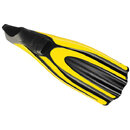Thanks for all the insight and information gang! This really helps me decide how I want to approach this. I'm thinking I'll buy the mask, snorkel and body suit (and probably the hot skin like mentioned earlier). I haven't heard anyone talk about buying boots for the fins yet. The only fins i've seen at the local dive shops do require boots. Are there fins that don't require boots?
Full foot fins are the other option. Typically worn barefoot so only in warmer climates. Sometimes they're worn with dive socks - thin neoprene socks with no hard bottom. Obviously they need to be the right size also.

Typically most divers use open-heel fins and boots of various thicknesses. Some dive with full-foot fins but they're more common for snorkelers. Most rental fleets use them also so they don't have to provide boots for all their dive guests.
Dive boots should have some tread on them so you don't slip on the boat deck, in wet locations etc. For shore diving in places like Bonaire they need to be thickly treaded so your feet don't get shredded on the ironshore/coral often just on/off shore there. Hawaii (the big island) might be another place where that would be good - some of the
shore dives there are directly off lava - it's pretty sharp. Typically Maui entries are off the beach.
I like a little thicker boot to keep both the straps and the top of the fin pocket from chafing my ankles also. Boots also provide some protection from things you can step on in the water - like small sea urchins. There's a lot of those at some locations in Hawaii.
If you're going to buy a wetsuit, buying a skin might be redundant. I have one for exposure protection
only as I sometimes dive where there's jellyfish, sea wasps or other stinging creatures. To a lesser extent it protects on shore entries over coral or lava.
Just about every wetsuit made has an inner layer - usually
something over finished neoprene - to help with donning it. Henderson for example advertises that some of their suits have a micro-fleece lining. As I mentioned previously a skin will help you don a wetsuit also - and keep you slightly warmer.






